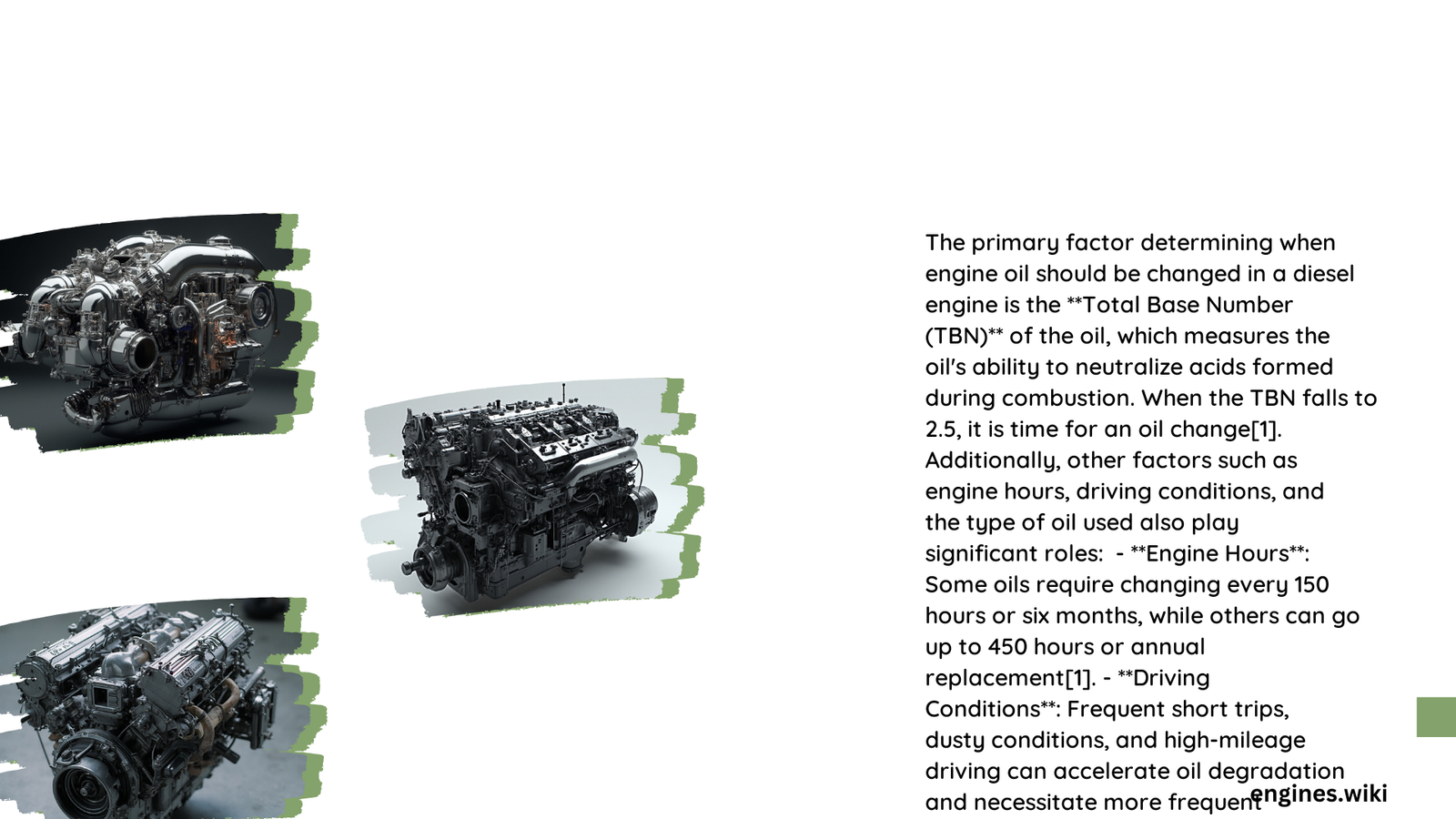Determining the optimal time for changing engine oil in a diesel vehicle involves considering multiple factors. These include specific driving conditions, quantifiable oil quality metrics, manufacturer recommendations, and cost considerations. The primary goal is to maintain engine health while balancing maintenance costs. This article explores the key factors that should guide diesel engine oil change decisions.
What Are the Specific Driving Conditions That Impact Oil Change Intervals?
Several driving conditions significantly influence the frequency of oil changes in diesel engines:
- Stop-and-go driving
- Heavy load towing
- Extreme temperatures (hot or cold)
- Engine modifications
- Dusty or dirty environments
These conditions can accelerate oil degradation by:
- Increasing soot accumulation
- Causing faster oil breakdown
- Introducing contaminants
- Placing additional stress on engine components
For instance, frequent short trips in urban areas can lead to more rapid oil degradation compared to consistent highway driving. Similarly, regularly towing heavy loads puts extra strain on the engine, necessitating more frequent oil changes.
How Can Oil Quality Be Quantifiably Assessed?

To objectively determine when an oil change is necessary, several measurable metrics can be evaluated:
- Oil Viscosity: Changes in oil thickness can indicate degradation or contamination.
- Total Acid Number (TAN): Measures the acidity of the oil, with higher values suggesting increased oil degradation.
- Particulate Contamination Levels: Indicates the presence of harmful particles such as soot, dirt, or metal.
- Moisture Content: Excessive moisture can lead to oil breakdown and engine corrosion.
These metrics can be assessed through professional oil analysis services, which provide detailed reports on oil condition.
What Are the Recommended Oil Change Intervals for Different Diesel Engines?
Oil change intervals can vary based on the type of diesel engine and its usage:
| Engine Type | Recommended Interval |
|---|---|
| Older non-DPF/SCR trucks | 3,500-5,000 miles |
| Newer DPF/SCR equipped trucks | 5,000-7,500 miles (normal conditions) |
| Severe duty conditions | 3,000 miles or 3 months |
| Based on operation hours | Every 400 work hours |
It’s important to note that these are general guidelines. Always consult your vehicle’s manual for manufacturer-specific recommendations.
How Do Costs Factor into Oil Change Decisions?
When considering the costs associated with oil changes, it’s essential to balance immediate expenses with long-term engine health:
- Premature Changes: While more frequent changes incur higher short-term costs, they can potentially prevent expensive repairs down the line.
- Optimal Timing: Changing oil at the right intervals helps maintain engine performance without unnecessary expense.
- Delayed Changes: Waiting too long between changes can lead to engine damage and costly repairs.
A cost-effective approach involves following manufacturer recommendations while adjusting based on specific driving conditions and oil quality assessments.
What Techniques Can Be Used to Assess Oil Quality?
Several methods can help determine when an oil change is necessary:
- Oil Sampling and Analysis: Professional labs can provide detailed reports on oil condition.
- Oil Life Monitors: Many modern diesel vehicles have built-in systems that estimate oil life based on various factors.
- Visual Inspection: While not as accurate as other methods, checking oil color and consistency can provide a basic indication of oil condition.
How Do Manufacturer Recommendations Play a Role?
Manufacturer recommendations serve as a crucial baseline for oil change intervals. However, they should be considered alongside:
- Specific driving conditions
- Oil quality assessments
- Vehicle age and condition
Always consult your vehicle’s manual for the manufacturer’s suggested maintenance schedule, but be prepared to adjust based on your unique circumstances.
What Role Does Engine Technology Play in Oil Change Frequency?
Advancements in diesel engine technology have impacted oil change intervals:
- Modern Filtration Systems: Improved oil filters can extend the life of engine oil.
- Engine Design: More efficient combustion processes in newer engines can reduce oil contamination.
- Oil Quality: High-quality synthetic oils designed for diesel engines can last longer than conventional oils.
These technological improvements have generally led to longer intervals between oil changes in newer diesel engines.
By considering these factors – driving conditions, oil quality metrics, manufacturer recommendations, costs, and engine technology – you can make informed decisions about when to change the oil in your diesel engine. Regular assessment and timely maintenance will help ensure optimal engine performance and longevity.
References:
1. Buds Diesel – How Often to Change Diesel Oil?
2. Dellen Chevrolet Buick GMC – How Often Does My Diesel Engine Need an Oil Change?
3. Auto Care Association – Automotive Oil Change Intervals Severe vs. Normal Driving
